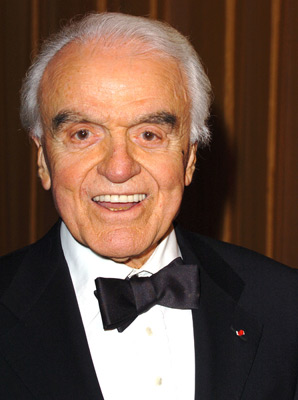 Jack Valenti, hero and villain to the American film industry, died today at the age of eighty-five, three years after releasing his viselike grip on the Motion Picture Association of America. I hope he enjoyed his brief retirement, but I’ll hazard a guess and assume he missed the day-to-day bare-knuckle brawling with Congressmen, studio chiefs, filmmakers, theater owners and his myriad critics in the media; the man relished a fight. He was never more eloquent than when defending a fiercely held ideal or protecting the legacy of his old friend, and fellow Texan, Lyndon B. Johnson, for whom he served as Special Assistant until Lew Wasserman lured him away to head up the MPAA in 1966.
Jack Valenti, hero and villain to the American film industry, died today at the age of eighty-five, three years after releasing his viselike grip on the Motion Picture Association of America. I hope he enjoyed his brief retirement, but I’ll hazard a guess and assume he missed the day-to-day bare-knuckle brawling with Congressmen, studio chiefs, filmmakers, theater owners and his myriad critics in the media; the man relished a fight. He was never more eloquent than when defending a fiercely held ideal or protecting the legacy of his old friend, and fellow Texan, Lyndon B. Johnson, for whom he served as Special Assistant until Lew Wasserman lured him away to head up the MPAA in 1966.
But Valenti wasn’t mean; though he wanted his opponent to know they’d been in a fight, he sought common ground, not the coup de grace. "I like to pour all the blood, muscle and sinew I can into a fight," he once boasted, but then added this caveat: "Downplay your own self-interest and make a senator look like a hero for voting with you."
Valenti was a throwback to an era of bi-partisanship. Mentored by "The Master of the Senate" himself, Valenti was an eloquent defender of the give-and-take philosophy abandoned in the post-"Contract with America" years. Having lobbied successfully on behalf of the film industry for close to forty years, he understood the difference between vigorous debate and blood feuds. No one swung with more gusto than Valenti, but no one was quicker to pick his combatant up off the canvas when the battle was done.
I emphasize this because I could easily vilify the man at length for his many missteps as the head of the MPAA. I could inveigh against his stubborn defense of the ratings system, which began to promote the kind of censorship its creation was meant to ward off when the X-rating became synonymous with pornography. I could enumerate the ways in which his compromise, the NC-17, was nothing more than a sidestepping of an issue he deftly addressed head-on in the late 1960s. And, by god, I could compose a fiery screed savaging his adherence to outmoded copyright laws and his old-school fear of emerging technology ("I say to you that the VCR is to the American producer and the American public as the Boston Strangler is to the woman home alone.")
Today, however, I want to honor Jack. I want to thank him for the way he transformed an industry struggling to redefine itself in the post-mogul era (more often than not, he saved the Hollywood from itself). In an age of "ums" and "ers", I want to express my admiration for his stunning, off-the-cuff oratorical brilliance (his only living equal in this department is Bill Clinton). And I want to say how much I’ll miss the salty old bastard. He ran the MPAA for thirty-eight years, and we’ll probably be debating his influence, good and bad, on filmmaking for the rest of our lives.
For a real obit, give this NY Times piece a read.